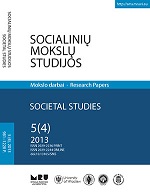Loginio ir kalbinio taisyklingumo įtaka mąstymo pokyčiams
Logical Validity and Linguistic Correctness: Impact on Changes in Thinking
Author(s): Virginija JakimenkoSubject(s): Social Sciences
Published by: Mykolas Romeris University
Keywords: thinking; logical and linguistic levels of a sentence; logical validity and linguistic correctness; changes in thinking
Summary/Abstract: The concept of thinking is an area of interest for researchers in a wide variety of disciplines: humanities, social and natural sciences. Unlike neurobiologists, who use special technologies to examine human brain activity, the scientists in humanities (philosophers and those of logic) research thinking only through language. The language itself is not only the means for capturing thought and its expression, but also one of the most important elements of culture. Each language, with its own system of words, vowels and grammar, is not only a unique source of knowledge about human life, but also the indicator and symbol of cultural identity. The changes in the language do not occur without reason, because every language is developing along with the economy, culture, science and technology. Thinking and language are very closely related processes, thus, for evaluation of changes in thinking, in this article it is assumed that changes made in language reflect the changes in thinking. Furthermore, this paper discusses features of thought expression, the conception of linguistic as well as logical levels of a sentence, the differences in logical validity and linguistic correctness and their influence on the changes of thinking in the light of the contemporary understanding of language and its relationship to thinking.
Journal: Socialinių mokslų studijos
- Issue Year: 5/2013
- Issue No: 4
- Page Range: 1029-1039
- Page Count: 11
- Language: Lithuanian

